- Home
- Catherine Jinks
Living Hell Page 7
Living Hell Read online
Page 7
‘Ottilie?’ Arkwright seemed a bit lost. Without his chair and his console, he looked untethered – a thin, gangly, awkward figure, bent at the knees as he shuffled around helplessly in front of his Array. ‘Ottilie, what’s the news? Have you got a fix on this stuff?’
The reply, when it came, was on Vindow. Ottilie’s head appeared, hovering in plasma: a seamed, drawn, colourless face under a swirl of grey hair. Ottilie was the oldest person on board. She had legs like drinking straws, and a voice like the rustle of thermosheets. Behind her, I caught a glimpse of BioLab, with all its piping and stowage. The piping looked vaguely odd, I thought. Less defined than usual. Less angular.
‘It’s protein-based,’ Ottilie crackled.
‘What?’ said Arkwright.
‘It’s protein-based tissue, containing amino acids. Some of the strangest amino acids . . .’ She shook her head. ‘Barely identifiable,’ she said, through tight lips. The picture flickered. ‘These molecules . . . we’re talking transition elements. Metalloids. There’s osmium in the peptide bonds. Osmium!’
I heard Conal catch his breath. ‘There’s osmium in the ship’s struts,’ he gasped. ‘Tuddor? There’s osmium in the casings, I’m sure. Osmium composites.’
‘Ottilie?’ said Dad. ‘What does that mean, exactly? Are we talking absorption, or what? Are we talking metal-eating bacteria?’
The picture broke up for an instant, before stabilising again. Ottilie was frowning. She was shaking her head in perplexity. ‘We’re talking tissue . . . we’re talking cells -’ ‘But what kind of cells?’ Mum requested. ‘Bacterial cells?’
‘I would say . . . collagenous cells.’
‘Collagenous cells?’
Mum’s squawk made us all jump. Ottilie said quickly: ‘There’s no direct correlation, Quenby, this stuff is new, it doesn’t fit the traditional classifications . . .’ Her picture wavered, as Lais turned to Mum.
‘What’s a collagenous cell?’ she asked shrilly.
‘Membrane,’ Mum replied, without taking her eyes off Ottilie’s distorted form.
‘Membrane?
’ ‘Ottilie, you’re breaking up,’ said Arkwright. It was true: the picture was deteriorating fast.
Dad said, ‘Get her on a linkup,’ and patched through to Sibber. ‘Sibber?’ he said. ‘Do you have the data through from BioLab?’
‘That’s affirmative, Tuddor, but -’
‘It’s protein. Membrane cells.’
‘Yes, but what do we do? You have to give me something, I can’t prep the RARs with this – I need more.
’ The RARs were our Remote Access Repair Units. They were large robotic troubleshooters, which could be activated in the case of serious impact-based damage, or if the nanosystems failed to respond on an atomic level. Conal shook his head.
‘Somehow I think it’s beyond RARs now,’ he muttered.
‘Hang on – wait.’ Arkwright was calling for silence. He made a damping motion with his hand. ‘Did you say three samples, Ottilie?’
‘. . . fshzzsamples,’ Ottilie responded, from Arkwright’s voice patch. Her picture had vanished from the Array, engulfed in random flecks of light. ‘Two collagenous, one . . . there’s a resemblance to chondrocytes -’ ‘Cartilage,’ Mum interjected.
Cartilage? I gaped at her. As in noses? And knees?
‘. . . some nucleic acids . . .’ Ottilie buzzed. ‘. . . atypical, though, because it’s bound up with vshomshh . . .
’ ‘Ottilie? Ottilie!’
‘Ark, there’s a lot of distortion here,’ said Lais – and she wasn’t talking about the Audio Interlink Network. ‘Ark, I can’t get my fingers out of the screen!’ But she did – abruptly – yanking them so hard that she stumbled backwards, and fell. When she hit the floor, it yielded.
It yielded like sponge.
‘Arkwright!’ Lais yelped. Her little heart-shaped face was suddenly dead white. She scrambled up, with Conal’s assistance. She tried to wipe goo off her hands.
One of Arkwright’s staff bolted for the door. I don’t know how many people noticed. There wasn’t a single challenge as he made his exit. Everyone’s attention was fixed on Arkwright.
‘Ask her about the fluid!’ Mum exclaimed. ‘Arkwright!
Ask her about the excretions, are they toxic?’
‘Ottilie! Do you read?’
Through a fuzz of interference came the reply. ‘Yes, I read you.’
Then my own voice patch beeped. Once again, it was Merrit. Her signal kept dropping out, like Ottilie’s.
‘Cheney, it’s Merrit – can you hear me?
’ ‘I hear you, Merrit.’ My lips felt numb.
‘. . . RARs . . .
’ ‘What?’
‘They’re malfunctioning!’ Suddenly, her voice was as clear as a bell. She was sobbing, and my heart nearly leapt out of my chest in fright.
‘Merrit? Merrit?
’ ‘. . . Dad saw them! Spraying the struts with acid – tell Tuddorvzshmmm . . .
’ ‘What? Merrit?’
‘. . . hydrochloric acid . . .’
The link went dead.
‘Merrit? Merrit!’ I tapped my collar. ‘Merrit 705 linkup!
Hello?’
But there was nothing.
‘Hydrochloric acid?’ echoed Mum, who had heard every word. We stared at each other. We both swallowed.
‘This diagnostic’s stalled, Arkwright!’ Lais wailed. ‘The whole display’s a mess. I can’t . . . it’s all distorted! The plasma’s clouding up!’
Arkwright headed straight for one of the junction ports. I knew about them, thanks to his careful training: they were behind an access panel in the bulkhead. When he slapped at the pressure catch, however, the panel didn’t behave as expected. Instead of sliding back, it flinched open, like the door. It flinched open like a heart-valve I once saw on our mimexic tour of the human body.
The human body?
I looked around as Arkwright plucked a photovoltaic tool from somewhere beneath his pressure suit. The entire compartment was now a different colour – no longer white, but a strange mixture of slippery pinks, waxy yellows, and livid purples. There were puddles of gloop everywhere. You could vaguely see the dark, stringy shapes of wires and cables through some patches of console, which had lost much of their density, becoming glutinous and transparent. The ribbing of the seams was much less defined. The samplers . . .
The samplers seemed to be throbbing.
‘Aagh!’
It was Arkwright. He had opened one of the electrical sub-conduits, only to be splashed by a spray of fluid. His laser pen clattered to the floor. Grey-faced, he staggered back, while the strange, yellowish liquid continued to spurt out of the junction port. It was dripping from his hand; he had apparently removed his glove assembly.
‘I – I had to get through the insulation . . .’ he croaked.
‘Put that under water! Now!’ Mum cried sharply. She sprang from my side, and retrieved Sadira’s Medkit. ‘Is it hurting, Arkwright? Is it burning?’
‘No . . .’ He was already stumbling towards the food dispenser. Mum went after him. Dad was staring at the leak, open-mouthed. We all were.
‘We – we have to patch it,’ Conal stammered.
‘Quenby! You got a patch there?’ Dad exclaimed, and tried once again to contact Sibber. ‘Sibber 24 linkup. Sibber 24 linkup! Hell and damnation – Gower 208 linkup!
’ Mum threw a packet of regeneration patches at Conal, who dropped them, picked them up again, and flew towards the junction port. ‘Keep your gloves on!’ Mum cried. I saw other people muttering into their voice patches, trying to make some kind of connection with other parts of the ship. They were edging towards each other, away from the dribbling bulkheads. Some were pulling on their headpieces. Above them . . .
Something moved.
I only just caught it – a flicker that tugged at the corner of my eye. Whipping around, I peered up, fearfully scanning a stretch of slimy ceiling. The seam-ribs bulged palely th
rough a layer of fibrous membrane. Something large and dark and indistinct lurked behind it. (An air duct, perhaps?) There was nothing else to see except the samplers. These small, round objects – part of the filtration system – had been stuck at carefully calculated intervals all over the various surfaces of Plexus. They were designed to analyse the air quality, and feed their results back to CAIP via microwaves.
They weren’t supposed to look like armless jellyfish.
Nor were they supposed to be . . .
‘Moving!’ screamed Lais. ‘They’re moving!’
CHAPTER
EIGHT
The samplers were moving. They were creeping across the ceiling and bulkheads like animated blobs of pink ice cream.
‘Yeah,’ said a voice. ‘The samplers are crawling around.
Didn’t you know?’
It was Dygall. I couldn’t believe my eyes. And I think Dad, for one, almost had a heart attack.
‘Dygall!’ he exclaimed, doing an abrupt, one hundred and eighty degree turn. ‘Zennor!’
Dygall and Zennor had got onto the Bridge – I don’t know how. Unless Zennor (who was, after all, a Senate member) had First Level clearance. He stood just behind his son, dragging his fingers nervously through his neatly clipped beard, his dark eyes bloodshot and anxious.
‘What – what are you doing here?’ Dad demanded.
‘I’m sorry, Tuddor, but I couldn’t exactly restrain him.’ Zennor had a beautiful voice, mellow and smooth. Even at that moment, when he was obviously a nervous wreck, I found him soothing to listen to. ‘It’s against the code of ethics -’
‘This is red alert, Zennor!’ Dad boomed. ‘You have an emergency station, and so does he! Where’s Darice?’
‘Um . . . she’s back in Sustainable Services . . .’
‘Where you should be! Both of you!’
‘What’s happening in Sustainable Services?’ Arkwright wanted to know. Mum was dabbing his left hand dry. ‘Is it anything like this?’ He waved his right hand at the drooling bulkheads, the spongy floor, the discoloured ceiling.
‘Probably,’ Dygall replied. ‘It was better than this when we left, but that was a while ago.’
‘We got out of our OTV,’ Zennor explained breathlessly.
He was still fiddling with his beard. ‘We didn’t like the look of it.’
That made everyone pay attention. ‘Why?’ asked Dad.
Dygall and Zennor exchanged glances. ‘It was . . . gooey,’ Dygall said at last.
‘It was running off the rails,’ Zennor added. ‘I’m sorry, Tuddor. I know we shouldn’t be here -’ He yelped then, and ducked. We all did. A sampler had whizzed over our heads.
It had flown from one side of the Bridge to the other.
‘Oh!’ Lais squeaked, and sat down abruptly. She sprang up again at the touch of the sticky, elastic chair, with its strange, swollen, pulpy purple cushion. ‘Oh my God,’ she whimpered, and Haido put an arm around her.
‘This is bad,’ someone murmured. ‘This is so bad.’
There was a brief pause. Finally Haido said, in an unsteady voice, ‘The patch is holding. We’ve plugged that leak.’
‘Okay.’ Dad placed a hand on each temple. ‘Okay, let’s think. Now, Zennor and Dygall got through. That means we can still communicate.’
‘Reconnaissance parties,’ said Conal.
‘Yes,’ Dad agreed. ‘It’s vital we keep in contact with Ottilie. Absolutely vital. She’s the only one who can give us an answer.’
‘I’ll go!’ said Haido.
‘Me too,’ said the balding Navvy beside her.
‘Not me.’ Arkwright was heading for the junction port again, as Mum ordered him to put on his gloves. ‘I’ve got to get into CAIP, somehow. Without CAIP, we’re finished.’
‘All right, you do that.’ Dad then pointed at the bald man. ‘Dane, you get to BioLab, see what you can find out, report back here. Like a runner. Understand?’
‘Yes.’
‘Don’t take the OTVs. Ilaria, you and Feng go to MedLab. Same deal. Zennor -’
‘We’re not going anywhere,’ said Dygall flatly. For some reason, he crossed the floor to where I was standing. ‘We’re staying right here,’ he declared, folding his arms. His sweaty scalp gleamed through his ginger fuzz.
‘Dygall -’
‘Darice will be waiting, son,’ Zennor remarked. Though his tone was pleasant – reassuring – he was actually wringing his hands. ‘She’ll be waiting for us.’
‘No, she won’t,’ Dygall retorted. ‘She’ll be trying to fix that busted dispenser.’
‘Dygall!’ Dad barked. He pointed at the door. ‘Get back to Sustainable Services!’
‘Make me,’ Dygall growled.
Dad took a deep breath, but before he could speak, Haido stepped forward. ‘I’ll go,’ she declared.
‘And I’ll go to TFP,’ someone else offered, heading for the door. All at once, there was movement – a general surge. I couldn’t help wondering if some of these people wanted to join their wives and husbands and partners.
Before it was too late.
Dad cried, across the milling heads, ‘TFP’s important, okay? TFP might have come up with an alternative comm-link!’ That was when I remembered, and touched Dad’s arm.
‘TFP’s in trouble, Dad,’ I told him. He glanced down at me.
‘What?’
‘Merrit called. TFP’s in trouble.’ I swallowed. ‘She said the Remote Access Repair Units were spraying the struts with hydrochloric acid.’
‘What?
’ ‘You mean – like the stuff in our stomachs?’ asked Dygall, who had been listening. And Mum, who had also been listening, said, ‘No. I mean, yes – there is hydrochloric acid in our stomachs. But if you’re talking about struts, you know what that sounds like?’ Her face was suddenly alert, her eyes as bright and sharp as an X-ray scalpel. ‘That sounds like osteoclasts. That sounds like bone-destroying cells -’
‘Wait,’ said Dad. His scouts were leaving, and he wanted a last word. Chasing them to the door, he barked, ‘Check the germinators! All the rats and the guinea pigs! Tell Ottilie to monitor them – if there’s anything toxic around, they’re bound to react!’
Dane raised a hand in acknowledgement, before disappearing. Almost at the same instant, the door panels uncurled, meeting in front of Dad’s face. When the two sides joined, they made a distinct slapping sound. Like wet flesh on wet flesh.
It turned my stomach.
‘Now,’ said Dad, shifting his attention back to my mum, ‘what was that about bone?’
There were eight of us left on the Bridge: Dad, Mum, Arkwright, Dygall, Zennor, myself, Lais, and Conal. We all clustered around Mum, desperate for an explanation – except for Arkwright. Arkwright was absorbed in the junction port.
‘Osteoclasts destroy damaged bone with hydrochloric acid,’ Mum announced. ‘Then the osteoblasts lay down more collagen and calcium, and repair the damage.’
‘And?’ Dad looked lost. His brow furrowed. ‘How does that relate to anything?’
‘I don’t know. It’s just . . .’ Mum waved her hands. ‘Well, look at all this!’ she exclaimed. ‘It’s organic! There’s fluid in the cable conduits! There’s cartilage in the walls! What does this suggest to you, Tuddor?’
‘I – I -’
‘This is organic life! This isn’t bacteria eating the hull, this is something else. This is a transformation.’
‘But it can’t be,’ Lais gasped. ‘How can it?’
‘Obviously, I don’t know.’
‘Wait a minute. Let me get this straight.’ Even Arkwright was listening. He stood frozen by the junction port, one hand poised over the opening. His great, bulging eyes were fixed on Mum. ‘Are you saying that we’re not dealing with technology any more?’
‘I don’t know.’
‘There are microbes in the hull,‘ Dad observed. ‘There’s DNA in the circuitry. There always was.’
‘Yes, but did it ever bleed before?�
�� Mum asked.
‘What about the lights?’ This was Conal. His gravelly voice sounded reassuringly calm. ‘The lights are still working.’
‘I don’t know about the lights.’ Mum glanced up, saw a sampler squirming across a light panel, and flinched. ‘The lights . . . I don’t know.’
It occurred to me that some bacteria produced light. I had learned about it at school – or was it during my stint in Sustainable Services?
You don’t need technology to produce light.
‘So we’ve got capacitors in CAIP that might have turned into synapses,’ said Arkwright grimly. ‘Electrical impulses that might have become chemical ones. Is that what you’re saying?’
‘I don’t know.’ Mum spread her hands. ‘It’s a possibility.’
‘Well, that’s going to make things difficult,’ said Arkwright. He turned his head slowly, to study the exposed workings of the Bridge. Already, to my eyes, they looked less like wiring and more like guts. ‘That’s going to make things very awkward.’
‘Look – let’s not jump to conclusions,’ Dad declared. ‘We can’t formulate any sort of deduction without solid, verifiable data. We need Ottilie’s input. Ow!’ Another sampler skimmed the top of his head, on its way from wall to ceiling. Everyone ducked automatically. We put our hands on our own heads, to shield ourselves.
‘Then maybe we should all go to BioLab,’ Mum suggested. ‘If that’s where the solution is.’
Dad glanced at Arkwright, who sucked in his cheeks. Before Dad could speak, however, someone else did. From behind the door.
‘Hello?’ said a muffled voice. ‘Hello? Can someone let me in, please?’
I must have squeaked, or jumped, because Mum stared at me. ‘Yestin!’ I gasped. ‘It’s Yestin!’ When Conal crossed the pressure pad, nothing much happened. The door panels, which were looking more and more like slabs of muscle, twitched and stretched, but snapped together again instantly.
Then Conal stamped hard on the pressure pad, and the panels shrank back once more. Because he stayed where he was, they even remained open. The hole, however, wasn’t very big.
Fortunately, it was big enough for Yestin. He began to scramble through it.

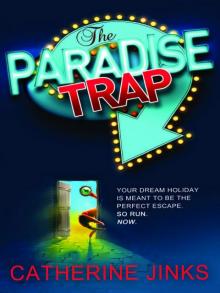 The Paradise Trap
The Paradise Trap A Very Singular Guild
A Very Singular Guild Eloise
Eloise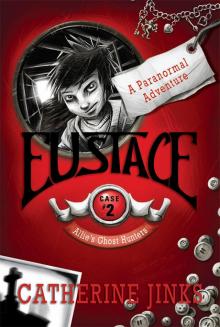 Eustace
Eustace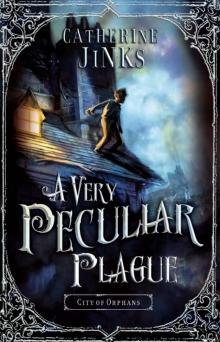 A Very Peculiar Plague
A Very Peculiar Plague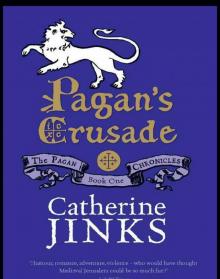 Pagan's Crusade
Pagan's Crusade The Gentleman's Garden
The Gentleman's Garden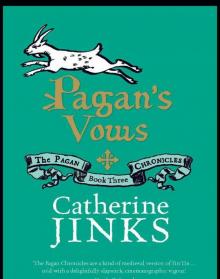 Pagan's Vows
Pagan's Vows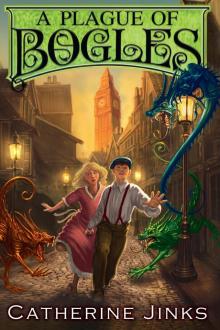 A Plague of Bogles
A Plague of Bogles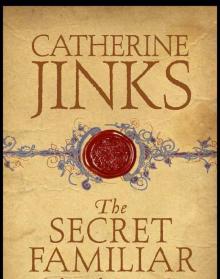 The Secret Familiar
The Secret Familiar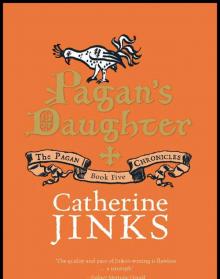 Pagan's Daughter
Pagan's Daughter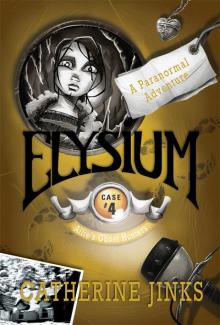 Elysium
Elysium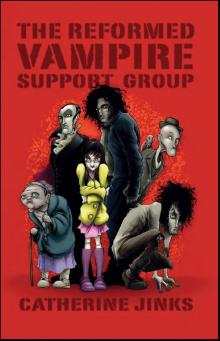 The Reformed Vampire Support Group
The Reformed Vampire Support Group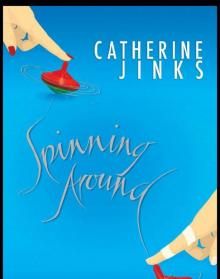 Spinning Around
Spinning Around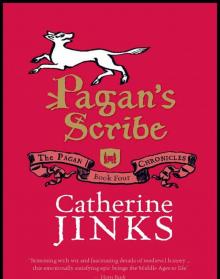 Pagan's Scribe
Pagan's Scribe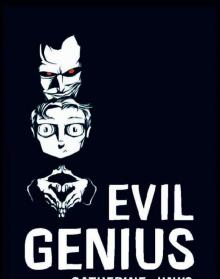 Evil Genius
Evil Genius Pagan in Exile
Pagan in Exile Shepherd
Shepherd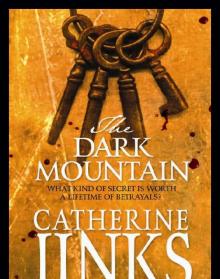 The Dark Mountain
The Dark Mountain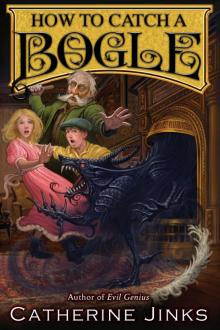 How to Catch a Bogle
How to Catch a Bogle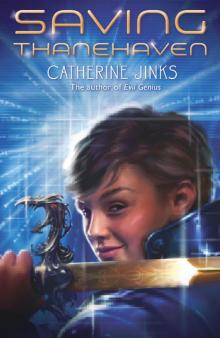 Saving Thanehaven
Saving Thanehaven The Genius Wars
The Genius Wars The Abused Werewolf Rescue Group
The Abused Werewolf Rescue Group Theophilus Grey and the Traitor's Mask
Theophilus Grey and the Traitor's Mask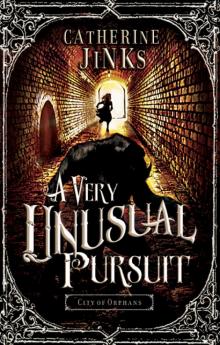 A Very Unusual Pursuit
A Very Unusual Pursuit Genius Squad
Genius Squad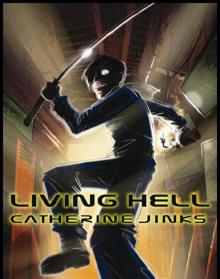 Living Hell
Living Hell The Road
The Road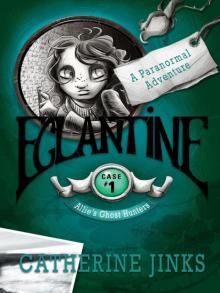 Eglantine
Eglantine